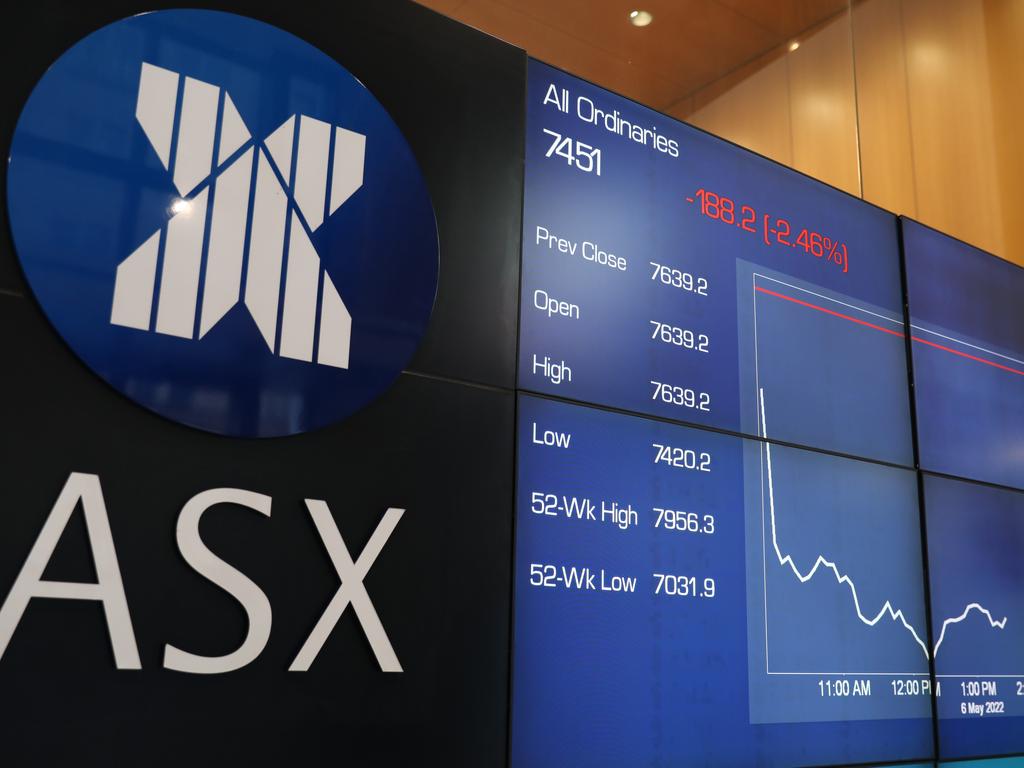Challenging time for investors with shares volatile
The sell-off in shares this year has arguably priced in a lot of risk, but inflation pressures and central bank tightening plans continue to provide a challenging backdrop for investors.

The sell-off in shares this year has arguably priced in a lot of risk, but persistent inflation pressures and central bank tightening plans continue to provide a challenging backdrop for investors.
After surging 1.5 per cent to a three-week high of 7286.56 on Monday, Australia’s S&P/ASX 200 share index was back on the ropes by Tuesday, diving 1 per cent to 7211.2 points.
It came as Wall Street futures turned down, the US 10-year bond yield rose 11 basis points to a one-week high of 2.85 per cent after blowout German CPI data, and the EU’s ban of seaborne imports of Russian crude oil lifted Brent crude oil 2 per cent to a three-month high of $US124.10 a barrel. Last week’s big rise in US shares came amid hope of a pause in rate hikes after the Federal Reserve said expediting a withdrawal of stimulus would leave it “well positioned” to “assess” the impact of rate hikes, and data showed consumers kept spending without accelerating inflation pressures.
But while the Fed minutes offered hope of a pause in rate hikes, they also said the central bank was “highly attentive to the upside risks to inflation” and a “restrictive stance of policy may well become appropriate depending on the evolving economic outlook and the risks”.
In a reminder of the fact that the US sharemarket faces a major test from the withdrawal of monetary policy stimulus, Federal Open Market Committee member Christopher Waller said: “I support tightening by another 50 basis points for several meetings.
“In particular I am not taking 50 basis point hikes off the table until I see inflation coming down closer to our 2 per cent target.”
In many ways the persistent strength of oil prices – up more than 50 per cent in the year to date – is a major inflation shock which risks a faster withdrawal of central bank policy stimulus, even if that increases the risk of recession.
RBC Capital Markets global equity strategist Michael Tran said the European Union’s decision to ban member states from purchasing crude and refined products by sea would result in 1.2-1.5 million barrels a day of seaborne shipments from Russia being “backed out”.
“Global trade flows are certain to be decisively up-ended as a result,” he said.
“This policy is perhaps a foreign policy win for the West, but it will prove economically inflationary for all nations involved given that the reshuffling of global flows is likely to be structural as long as the war remains a slow burn.
“This will make sourcing barrels increasingly expensive, thus putting upward pressure on oil pricing.”
Amid extreme pessimism in the US sharemarket, Canaccord Genuity equity strategist Tony Dwyer said last week that Wall Street “remains oversold enough to allow for a summer rally in areas like banks and info tech on the belief the market has discounted the Fed”.
But the only thing that would be able to generate or confirm the bottom has been reached would be a dramatic change in signalling from the Fed.
“For economic growth there needs to be money available and that currently does not appear to be the case with inflation outpacing wages, cost of mortgage funding spiking, and significant losses in stocks and bonds,” he cautioned.
“We believe the pieces remain in place for ‘a’ bottom, but ‘the’ bottom needs a change in Fed policy that could create an improved outlook for money.”
Similarly, Citi’s head of US equity strategy, Scott Chronert, said: “Our high-level takeaway is that the equity markets have reached a peak bearishness related to Fed expectations and recession risk.
“From here, we suspect that volatility will move more down the single stock path.”
In his view, financial markets were “much closer to pricing in a recession at their lows than any sort of soft landing scenario”.
“The reset in positioning likely reflects this concern, meaning negative price action that feeds on itself, or selling on any sort of strength, is unlikely to persist near-term.
“Ultimately, the confidence in the earnings outlook should be the driver of stocks from here, not further recession fear or Fed-induced multiple de-rating.”







To join the conversation, please log in. Don't have an account? Register
Join the conversation, you are commenting as Logout